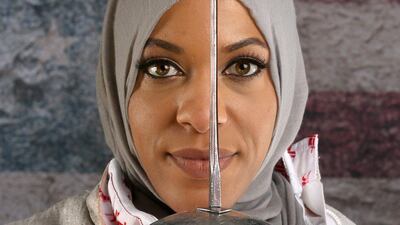LOS ANGELES // Ibtihaj Muhammed stood beaming on the podium in Budapest in 2013, flashing a bright smile, a world championship bronze medal and the red, white and blue hijab that perfectly encapsulated who she is as an athlete and a person.
Muhammed, a New Jersey-born fencer, is a proud Muslim and an equally proud American. And this summer at the Rio Olympics, Muhammed will seek to stand up for her community by fighting for a country that hasn't always fought for those who share her faith.
Muhammed, the middle daughter of a retired detective and special education teacher, will become the first US athlete to compete in the Olympics while wearing a hijab, the headscarf required of Muslim women.
Those circumstances have put Muhammed, 30, on a platform well beyond sports. She's hoping her presence as an Olympian can help counter the recent wave of anti-Islamic sentiment in the US, triggered in part by Donald Trump's comments about banning Muslims from the US.
“I feel like I’ve been blessed to be in this position, to be given this platform. When I think of my predecessors, and people who’ve spoken out against bigotry and hate, I feel like I owe it not just to myself but to my community to try to fight it,” said Muhammed, who is ranked seventh in the world in the women’s sabre. “There are people who don’t feel safe going to work every day, that don’t feel safe being themselves. I think that’s a problem.”
More Olympics: Emirati sailing champion looks to fly UAE flag in Rio
Muhammed tried nearly every sport as a kid, from softball and track to tennis. But the constant modifications Muhammed would have to make to her uniform — like adding sleeves or wearing trousers when her teammates had on shorts — were growing tiresome.
Then one day while in the car with her mother, a 12-year-old Muhammed noticed a fencing practice through the windows of a local high school. Since fencers are covered from head to toe for protection, Muhammed knew right away she had found her calling — and perhaps even a way to help pay for college.
Muhammed soon hooked up with the Westbrook Foundation, an organisation run by former Olympian Peter Westbrook to teach fencing to underserved communities in metro New York. She later earned a scholarship from Duke, where she was a three-time All-American.
“Don’t be fooled by that pretty face. She has something in her that it takes in real champions, that unbelievable will to win,” said Westbrook, who in 1984 became the first African-American to win an Olympic medal. “She is able to dig five stories deep to pull something out.”
Still, Muhammed put fencing largely aside after college, turning to teaching while she considered applying to law school. But she was still curious enough about her fencing to turn to a new coach, Akhi Spencer-El, who is also connected with the Westbrook Foundation.
Muhammed was Spencer-El’s first protégé. Muhammed said she found in him someone who believed in her abilities as much as she did. That was enough to give Muhammed the push she needed to rededicate herself to the sport.
Also see: Find all of The National Sport's long reads in one place
“I noticed she was something different. There was so much competitiveness,” Spencer-El said. “I knew I could get her to be on a level with the best in the world.”
It took a while, but Muhammed got there. Muhammed made her first world championship in 2010, and she helped the Americans win a team bronze a year later. Two years ago, Muhammed was part of her first gold medal-winning senior world team.
Athletes have had to fight for the right to wear religious head coverings in sports like basketball and football, where Fifa changed its rules to allow hijabs in 2012.
But Muhammed has never had to downplay her faith in competition or in life. She often sports multicoloured hijabs on and off the strip and has even started a clothing website with her siblings, Louella.com, for Muslim women seeking more colourful options while still adhering to their religion.
Muhammed has suffered her share of backlash, though. On Saturday at the South by Southwest festival in Austin, Texas, Muhammed was asked by a volunteer to remove her hijab for a security photo and later tweeted that she couldn’t “make this stuff up.”
But Muhammed is intent on using her time in the spotlight to show the US and the rest of the world that Muslim-Americans should be embraced rather than shunned.
“I’ve never questioned myself as an American and my position here,” Muhammed said. “This is my home. This is who I am. My family has always been here. We’re American by birth, and it’s a part of who I am and this is all that I know.
“So when I hear someone say something like, ‘We’re going to send Muslims back to their country,’ it’s like, “Well, where am I going to go? I’m an American.”
Follow us on Twitter @NatSportUAE
Like us on Facebook at facebook.com/TheNationalSport

